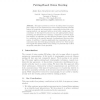153 search results - page 25 / 31 » Multi-factor Authenticated Key Exchange |
120
click to vote
CCS
2005
ACM
15 years 8 months ago
2005
ACM
Protocols for authenticated key exchange (AKE) allow parties within an insecure network to establish a common session key which can then be used to secure their future communicati...
122
click to vote
TDSC
2008
15 years 2 months ago
2008
Inspired by unidirectional error detecting codes that are used in situations where only one kind of bit error is possible (e.g., it is possible to change a bit "0" into a...
116
click to vote
PET
2007
Springer
15 years 8 months ago
2007
Springer
Abstract. This paper presents a novel use of pairing-based cryptography to improve circuit construction in onion routing anonymity networks. Instead of iteratively and interactivel...
120
Voted
STOC
1999
ACM
15 years 6 months ago
1999
ACM
Oblivious polynomial evaluation is a protocol involving two parties, a sender whose input is a polynomial P, and a receiver whose input is a value α. At the end of the protocol t...
120
click to vote
IEEECIT
2010
IEEE
15 years 10 days ago
2010
IEEE
The small subgroup confinement attack works by confining cryptographic operations within a small subgroup, in which exhaustive search is feasible. This attack is overt and hence ca...

